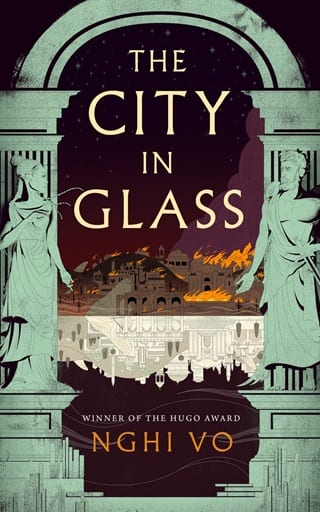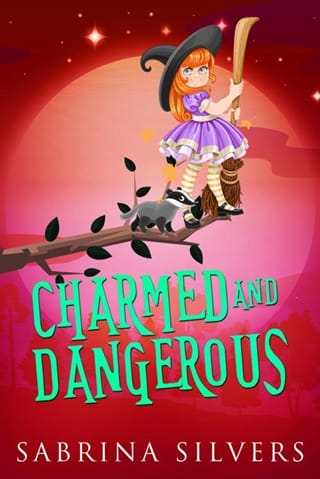Chapter Three
THREE
Long before the city became known as Azril, a refugee woman stepped onto its floating pier carrying a glass jar filled with flower bulbs, and clinging to her green and tendril dreams was the demon Vitrine.
All of them—woman, bulbs, dreams, and demon—were freshly come from the fall of a great city in the south, whose gates were guarded by stone-winged bulls until the moment they weren’t. In fifty years, the conquerors would leave it, and a few decades after that, so would the revengers. In a century, the scavengers would be gone, and in another, so too would be the ghouls. The city in the south would go the way of limestone, crumbling into the desert until nothing was left but an archaeological layer of dark gray ash and sorrow.
When Isra bin Khouri arrived, however, the city in the south was still a smoking ruin, and this city on the edge of the sea was nothing special. The people who had lived there first were killed by the people who landed there next, and they were in turn killed by the wave that came after. It was a pirate’s nest with pretensions of finer, with stolen banners flying from the ropes hung between tall poles, the men and women adorned with polished jade pebbles and rough garnets. The children wore antlers of coral strung around their necks to keep them safe when they paddled their coracles in the bay, and the ships in the harbor unfurled sails of vermilion, goldenrod, and lilac, making Vitrine think of Isra’s old greenhouse before the glass was shattered and Isra’s family fell among the shards.
The woman Isra took a tighter grip on her glass jar, snugging it close to her ribs like a baby, and she disappeared into the city. From there, where she went and what happened to her was a mystery, but Vitrine managed to give her a gentle invisible kiss on the back of her neck just before she was gone, a blessing, a hope, a thanks for the ride out. Then Vitrine was alone on the pier, alone as she never was in the city to the south.
The sailors and fisherfolk dodged around her, knowing instinctively without seeing that there stood one who had been formed out of rebellion and rage, shaped by her own hand rather than one greater. She was a thing that had been pared down by pain until there was only a sliver of her left, and everything she had regained, from the top of her dark head to her gleaming black eyes, to her sharp white teeth to her brown skin hectic with a madder blush, she had made herself.
Vitrine’s first steps into the city that would be Azril were heedless, and her next were doubtful. It was colder than she was used to, and the wind that whistled through the narrow streets was no kin of hers. It came down from the glaciers of the north, and in it Vitrine could taste the pine and the snow. If she drank too much of that cold, she thought it might freeze her from the inside out, and she shook her head.
The people were paler as well, with skin that was ren dered white and red from the winds. There were fewer people who looked like her and the ones she had loved previously. Vitrine peered into their faces as they parted for her, all unknowing. She was looking for something familiar, some scrap of someone she had known before. She had known so many people, and she watched for their faces to return, washing up on the beach before the water took them back.
Once or twice, she felt a shiver of recognition, some eye or cheek or smile that she had known before, but when she hurried after it, she was always wrong, and being wrong stung.
Finally, Vitrine ended up at Gallowscross. It had once been nothing more than one road kissing another, but the rest of the city webbed out from it. The square gained its name from the scaffold built from old ship timbers along the westward side. The gallows could still remember being a ship, and in the wind, it rocked slightly, searching for the spray and the northernmost star that could no longer guide it.
Vitrine stood below the platform, stroking the upright timbers soothingly, and she took a closer look up at the three figures hanging from the beam as they looked down at her.
“Well, look at you,” said the first, a man with laps of scarring across his right cheek. “What manner of thing are you?”
“Fine and mighty, whoever she is,” said the girl with the pearl face and her hair cut short. “Hey, are you here to fetch us?”
Before Vitrine could say that had never been any of her business, the third spoke, a narrow figure in a long kilt and a hooded garment that covered most of their face. The noose—woven from tough grass and wool fiber—sat over the scarlet of their hood.
“Not her,” they said quietly. “She’s here for bigger than us. Aren’t you?”
“Maybe I am,” she said, irritated with being caught out, but before she could say more, a low drumbeat sounded, the sound quick as a frightened heartbeat. It echoed through Gallowscross, but before Vitrine could ask what it was, it was answered by the high breathy shrill of a pipe, something made from metal with a tin shriek to its voice.
Vitrine had heard plenty of good music in her time. One of her sisters was made of it, nothing more than a tune that leaped from head to head, sometimes given glorious form through a viol or a flute, and other times only carried as softly as a hopeless wish. Vitrine’s sister danced through a thousand years, but something about this song made Vitrine pause for the fast staccato beats, the phrases that were clearly meant to be sung and danced.
“What is that?” she asked, and the scarred hanged man smiled.
“It’s a song as old as the city,” he said kindly. “Everyone knows it.”
“It’s silly, ” said the insolent hanged girl with a sigh. “I used to belong to the Sui Emperor, and such music we had there. Still, it makes you want to dance.”
“I should think we have had enough of dancing today,” said the hooded hanged person sharply, but their feet were already tapping again in the air, and with a laugh and a sigh respectively, the man and the girl joined them.
An older woman with a handsome face and one arm that ended in a leather cap instead of a hand came by to light the round lantern hanging from the gallows. Vitrine knew that custom at least, that the dead should not spend their last night in the world in the dark. The lantern was made from pale green glass, and it sent verdigris light scattering over Gallowscross, the dancing feet of the dead, the ruts of mud, the one-handed woman’s splendid eyes, and Vitrine’s long shapeless white robe.
Vitrine held up her hands curiously. Through her long fingers and the uncanny green light, she could see, truly see, the city that would become Azril, and fatally and at once, like an angel would three hundred years later, she fell in love.
With a shout of joy, Vitrine leaped up on the gallows, and she danced with the dead, her feet on the splintered boards and theirs in the air. They could not bow to her, too stiff from their day’s sorrow, but she bowed extravagantly to them, a final honor before they were picked up by the White Ship or the Click-Clack Hag or perhaps even something winged that they would think was an angel.
They were leaving just as she was arriving, and Vitrine knew with a burning passion that she would miss them so.
“Mine,” she said, and then she turned to shout it to the city in a voice that could be heard only by the dead, the listening, and the cats.
Home, Vitrine thought, which was just another way to say how it was hers, and then wrapping her robe a little more snugly around her shoulders, she disappeared into the shadows.
Gallowscross was still there.
It took Vitrine some time to recognize it, with the buildings on both sides torn down and the glorious mosaic plaza, turquoise and orange diamonds, broken to dust. It had not been a gallows in a long time, but when she put her hand down to the ground, she could still sense the sorrow and the fury and the grief there, far older than this contemporary destruction.
“Oh, but I am sorry, ” she whispered, feeling for all the world as if she had been given something precious and then through carelessness and neglect caused it to come to harm.
She shook her head, forcing her spine straight and refusing the guilt.
She had been given nothing. She had taken it, and it was hers to neglect and destroy if she so chose. Her family had learned that much from watching the humans that swarmed the world, that love could be a destructive thing. The angels understood love as destruction. She had chosen a different way to love Azril, and this destruction had nothing to do with her.
Vitrine knew she had a great deal of work in front of her, but she paused in Gallowscross. From the depths of her memory and the writing in her book, she could summon forth the old gallows and the three who hung there her first night in town. She closed her eyes, and she saw them hanging still. They had gone on the way that humans did, and they had nothing to do with her, but she was a demon, and therefore they were less than souls, but more than memory.
“Well, what a mess,” said the figure in the hood. “No one will ever dance here again.”
“No, people dance everywhere,” corrected the man with the scars. “Different songs, different people to hear, but they’ll dance.”
“What did you do ?” accused the insolent girl. “Why did you make them so angry?”
Vitrine tossed her head proudly, ignoring the weight of guilt that tried to settle on her shoulders.
“I didn’t send fire to tear down the towers. I didn’t turn a city of sixty thousand to charcoal and ash. That wasn’t me.”
“But you’re here to fix it,” observed the person in the hood. “That implies some responsibility.”
“It’s mine,” Vitrine agreed. “Mine to tend, and mine to grow great again. Tell me what I can do for you here.”
The scarred man swung one leg restlessly, turning in a slow arc, and he did not speak until he came around to face her again. His face when he returned was clean and unswollen, the way it must have been before they hanged him. He had been a handsome man, and not for the first time, Vitrine wondered why he had swung.
“We only knew each other for a short time,” he said apologetically. “We died here, and we’re gone now, so we can’t really help you. I’m sorry.”
“I think there might be white flowers,” the hanged girl said abruptly, and Vitrine turned to her.
“Flowers for the dead?” Vitrine had heard that white was the color for mourning in the Sui empire.
“Flowers for me, ” the girl said, aggrieved. “No one liked flowers as much as I did, and no one ever brought me enough of them. I want white flowers.”
“Might as well ask for an honest scholar,” sniped the person with the hood. “Might as well ask for the heart of the moon. Might as well ask for them to play us the ganli again.”
“White flowers,” Vitrine said, looking around and wanting to cry. The dirt under the broken tile was blasted and sere. Before that, it had been city dust, trodden over so well it wouldn’t grow weeds, let alone flowers.
“An angel could make white flowers grow,” the girl from Sui said pointedly, and Vitrine nodded.
“I’m not sorry. I didn’t tear down the towers. But white flowers. I’ll remember.”
 Fullepub
Fullepub 



